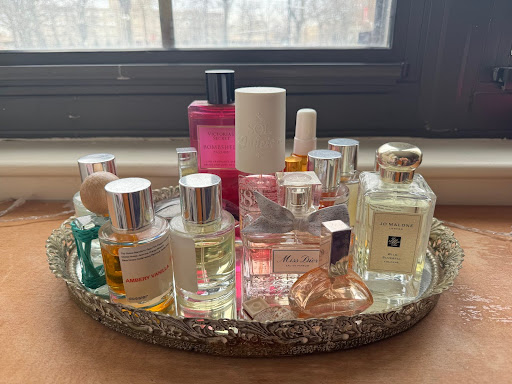
Shopping for a new signature fragrance can be a daunting task. With scents ranging from floral and fruity to woody and oriental, how can college students determine what fragrance best aligns with their personality and style? Here are some creative ways to decode the art of perfume selection.
Brush Up on the Basics
Research and explore the scent families that appeal to you. Are you drawn to fresh and citrusy notes like lemon and bergamot? Or perhaps the warmth of vanilla and amber? Maybe you like woodsy fragrances like leather and pine. Understanding these basic scent categories can narrow down the choices and lead you to perfumes that resonate with your personal preferences and styles.
To determine what fragrance(s) you are looking for, tap into your artistic side by creating a scent mood board. Gather images, colors and textures that evoke the feelings and aesthetics that you resonate with. For example, if you’re drawn to nature and tranquility, your board might feature soft greens, floral patterns and images of landscapes. Use this visual guide to steer your selection towards fragrances that reflect your mood board’s essence.
For the next step, there are two ways to determine your fragrance family: scent-based and ingredient-based. Scent-based perfumes can be both synthetic and natural, and a simple fragrance quiz can be taken to discover your next favorite scent. For more ingredient-based recommendations, there are guides on fragrance notes that customers can view in order to be aware of how the ingredients of certain perfumes will react if you have sensitive skin.
Know Your Skin Type
Have you ever noticed that a perfume smells heavenly on your friend and is not too overpowering, but on your skin it’s strong and lingers too long? This isn’t because the fragrance doesn’t suit you — it’s actually because of the pH of your skin!
Essentially, your skin’s pH levels decide how any perfume will react with it. The pH level of the skin indicates its acidity or alkalinity, ranging from 0 (highly acidic) to 14 (highly alkaline), with 7 as neutral. Typically, people’s skin has a pH between 4.5 and 5.5. When applying a fragrance, it does not merely remain on the skin’s surface. Instead, it blends with natural oils, a process influenced by pH level. The resulting scent can vary subtly or noticeably from the original perfume.
It is important to note that your skin’s individual pH balance — affected by factors such as diet, skin type (dry or oily) and even the weather — significantly impacts how a fragrance will smell on you.
So, how can you choose the best fragrance for your skin type? If you have oily skin, perfumes tend to last longer and smell more intense because the oils retain the fragrance. Consider a natural perfume so that you can enjoy a long-lasting scent without the overpowering nature of synthetic ones.
If you have dry skin, perfumes may not last as long; in this case, fragrances tend to evaporate quicker, causing users to reapply several times throughout the day. Opt for a stronger, bolder scent that has a higher concentration of perfume oils; these will linger on your skin longer than a natural perfume would.
Sample and Experiment
Don’t be afraid to sample different perfumes before committing to a full bottle. Visit stores like Ulta, Bloomingdales or TJMaxx that have fragrance sections or utilize sample subscription services to test out a variety of scents over time.
Wearing each fragrance for a day or two will allow you to see how it evolves on your skin — and if you’re sick of it after 20 minutes, then you know to try something different. Keep notes on what you like or dislike about each fragrance to refine your preferences.
These sample and mini sizes of perfumes are great options as the season and occasion can influence your fragrance choice. Light, fresh scents are perfect for spring and summer, while richer, spicier fragrances are ideal for fall and winter.
Likewise, consider the setting and purpose of wearing the perfume. A casual, everyday scent may differ from a sophisticated evening fragrance. Purchasing more than one sample for more than one occasion allows for variety and some change from your everyday scent.
By incorporating these creative approaches, students can navigate the complex worlds of perfumes with confidence and find a signature scent that not only smells fantastic but also complements their unique personality.







